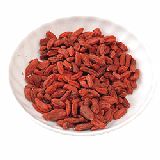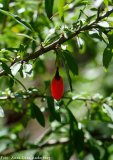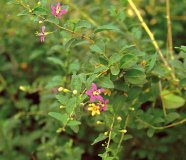Wolfberry Fruit
http://www.100md.com
《e Natural Health Center》
 |
 |
 |
 |
Yin Tonics
Wolfberry Fruit
Latin:
Fructus Lycii
Origin:
The dried mature fruit of the plant Lycium barbarum L., of the family Solanaceae. Wolfberry fruit is used extensively in Chinese herbalism. The fruits are the berries of Lycium chinense and more commonly Lycium barbarum. The roots also have healing properties. Native to east Asia and Europe, it grows wild on hillsides in the cooler regions of northern China and Europe. However, it is also grown as a cultivated plant in almost all parts of China and in some other regions of Asia, as well as naturalized in Britain, the Middle East and North America.
, http://www.100md.com
Wolfberry fruit is a shrub that grows to about 2.5 m by 2 m at a medium rate. It is in flower from June to August, and the seeds ripen from August to October. The flowers are hermaphrodite (have both male and female organs) and are pollinated by bees. The plant can grow in semi-shade (light woodland) or no shade. It requires moist soil. The plant can tolerate maritime exposure.
In China, the best wolfberry fruits are produced in the provinces Ningxia, Gansu and Qinghai. Its tender leaves are edible and the fruits and roots are used as medicinal foods. The bright red berries are usually harvested in late summer or early autumn when the fruit is mature, dried in the shade until the cortex is wrinkled, and dried in the sun until the fruit is crusted with the pulp still soft. It is used unprepared. The roots are usually harvested in the spring, although they can be dug any time of the year. The roots can be used either fresh or dried.
, 百拇医药
Also called Lycium Fruit, Matrimony Vine Fruit, Chinese Desertthorn Fruit, Box Thorn Fruit and Chinese Wolfberry Fruit.
See also Food, Fruits, Wolfberry Fruit; Food, Vegetables, Wolfberry; and
Heat Clearing Herbs to Clear Heat of the Deficiency Type, Wolfberry Bark.
Properties:
Sweet in flavor, mild in nature, it is related to the liver, kidney and lung channels.
, http://www.100md.com
Functions:
Nourishes the kidney yin and liver blood, improves one's eyesight, and moistens lungs.
Applications:
The first recorded use of wolfberry fruit as a medicinal herb is from the first century A.D. For thousands of years it is used as both a yin tonic for liver and kidney, and as a blood tonic.
Wolfberry fruit possesses an action antagonistic to fat deposition, especially in the liver. So it is often applied in obese patients and in liver disease with lipidosis. It lowers the level of blood sugar and is beneficial to diabetes.
, 百拇医药
1. To treat aching and general weakness due to deficient kidney, manifesting dizziness, impaired eyesight, tinnitus (ringing noise in the ears), impotence, weak waist and knee, night sweat:
a) Wolfberry fruit is often used in combination with rehmannia root, dodder seed, dogwood fruit and other herbs for tonifying the liver and kidney.
b) Immerse 30-60 g wolfberry fruit in 60 percent liquor for at least 7 days (the longer, the better). Drink 5-10 ml each day.
, 百拇医药
2. To treat weak or blurred vision due to yin deficiency of the liver and kidney:
The food-herb is often used in combination with chrysanthemum flower, rehmannia root, Chinese yam and other herbs for nourishing yin and improving vision, such as Qi Ju Dihuang Pill.
3. For the aged and infirm:
Prepare 25 g fruit to make rice porridge. Use porridge as a regular meal once or twice daily.
, 百拇医药
4. To treat diabetes mellitus (relative or absolute lack of insulin leading to uncontrolled carbohydrate metabolism):
Prepare 15 g fruit, 250 g rabbit meat and cook it under slow fire until the meat is well done. Add salt and flavouring and serve as a side dish.
Dosage and Administration:
5-lO g.
Decoction.
, http://www.100md.com Cautions on Use:
People who have a fever due to infection or who have diarrhea or bloating is advised not to take wolfberry fruit.
Although no records of toxicity have been seen, some caution should be exercised with this species, particularly with regard to its edible leaves, since it belongs to a family that often contains toxins. However, use of the leaves is well documented and fairly widespread in some areas. The unripe fruit might also be suspect though the ripe fruit is wholesome.
, http://www.100md.com
Reference Materials:
Toxic or Side Effects:
There are no reported side effects from taking wolfberry fruit. Wolfberry fruit has been used for centuries, both as a healing herb and as a food.
Modern Researches:
Wolfberry fruit is rich in carotene, vitamins B1 and B12, and vitamin C. The fruit also contains amino acids, zeaxanthin, betaine, physalien, B-ergosteriod, iron, and trace elements essential to the body, including zinc, copper, selenium, calcium, and phosphorus.
, 百拇医药
Wolfberry fruit has the effects of enhancing phagocytosis (uptake of material, such as microorganisms or cell fragments into a cell) of the reticuloendothelial system (including the fixed macrophages of tissues, liver and spleen), increasing peripheral white blood cells, enhancing humoral and cellular immunity and promoting hematopoietic (give rise to distinct daughter blood cells) function.
Betaine, a biological stimulant, has the effects of stimulating growth, reducing blood sugar and blood lipid, inhibiting the fat deposition in liver cells and promoting the regeneration of liver cells. The herb has the cholinomimetic effects of reducing blood pressure, inhibiting the heart, exciting intestines, and has estrogen-like effects.
, http://www.100md.com
It was demonstrated that this fruit yields a prominent action in protecting the liver from lipid accumulation. When mice were poisoned with CC1 in the laboratory, those receiving administration of extracts from this fruit yielded no liver function impairment, while the control group, which received no protection, were mostly poisoned and killed.
Wolfberry fruit is traditionally believed to have many different effects upon the body. In addition to being a general longevity herb, it is said to raise the spirits, fight depression, and increase cheerfulness. Berries are made into a blood tonic that is given for general weakness, to improve circulation, and increase the cells' ability to absorb nutrients. When blended with more yang herbs, wolfberry fruit is used as a sexual tonic.
, 百拇医药
In Chinese medicine, the liver is associated with the function of the eyes. Wolfberry fruit is used as a liver tonic to brighten the eyes, improve poor eyesight, treat blurred vision, sensitivity to light, and other general eye weaknesses.
One of the qualities ascribed to wolfberry root is that it "cools the blood." It is used to reduce fever and to treat other conditions of "excess heat." These include traditional uses to relieve excess sweating, stop nosebleeds, reduce vomiting, and treat dizziness. Some herbalists use a tea made of wolfberry root and Scutellaria (skullcap or Huang Qin) to treat morning sickness in pregnant women. Wolfberry is also used to treat certain types of coughs and asthma.
, 百拇医药
Modern herbalists use wolfberry roots to treat high blood pressure. There is some scientific basis for this treatment, since extracts from the root have been shown in laboratory experiments to relax the involuntary muscles, including artery muscles. This relaxation lowers blood pressure.
Other modern scientific studies have shown that extracts of wolfberry root can reduce fever, including fever associated with malaria. One Korean study published in 1999 looked at the effect extracts from the berries and roots had on the blood of mice that were exposed to whole body x rays. They concluded that the mice that received doses of root extract replaced leukocytes, erythrocytes, and thrombocytes faster than those that did not receive the extract. This effect may account for wolfberry fruit's reputation for creating good health, vigor, and long life., 百拇医药